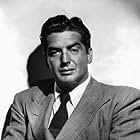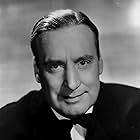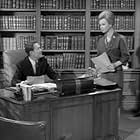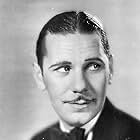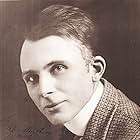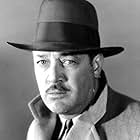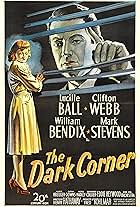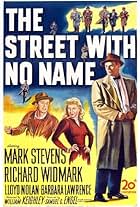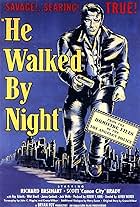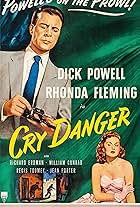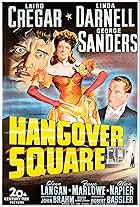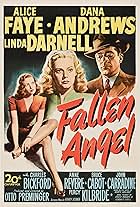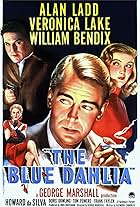IMDb RATING
7.2/10
5.6K
YOUR RATING
Why is Inspector Ed Cornell trying to railroad Frankie Christopher for the murder of model Vicky Lynn?Why is Inspector Ed Cornell trying to railroad Frankie Christopher for the murder of model Vicky Lynn?Why is Inspector Ed Cornell trying to railroad Frankie Christopher for the murder of model Vicky Lynn?
May Beatty
- Lady Handel
- (as Mae Beatty)
Brooks Benedict
- Nightclub Patron
- (uncredited)
Edward Biby
- Nightclub Patron
- (uncredited)
Stanley Blystone
- Police Detective
- (uncredited)
- Director
- Writers
- All cast & crew
- Production, box office & more at IMDbPro
Storyline
Did you know
- TriviaImmediately before shooting, a bottle of silver nitrate was accidentally spilled onto Carole Landis' lips by her dentist. As a result, her lips were blue for more than three weeks, posing an added challenge for the makeup crew.
- GoofsJill's new address is apartment F, but when Cornell visits, the door is clearly marked 3B.
- Quotes
Ed Cornell: I'll follow you into your grave. I'll write my name on your tombstone.
- ConnectionsFeatured in Biography: Betty Grable: Behind the Pin-up (1995)
- SoundtracksStreet Scene
(uncredited)
Music by Alfred Newman
[Played over main titles, then heard as background music throughout the movie]
Featured review
A pretty waitress is given a shot at the big time by a handsome sports impresario. She grabs her chance with alacrity, but Fate has plotted a different course for her ...
Bruce Humberstone directs this attractive early noir with a strong sense of visual style. His Director of Photography, Edward Cronjager, works wonders with elongated shadows and labyrinths of lattice.
Victor Mature looks good as Frankie Christopher, the romantic lead. Always a fairly limited actor, he never the less captures his character's ambivalence sufficiently well for the viewer to be kept wondering about him until the final reel. But for all Mature's efforts, Frankie remains a lightweight. He spends more time onscreen than anyone else, but remains in the viewer's memory less successfully than the other three leads.
After almost a decade in films, Betty Grable was 25 years old in 1941 and already an established star when she took on the role of Jill Lynne. Her character has psychological depth, and Grable does justice to the part. Jill is the slightly staid older sister of Vicky the glamour girl. While Vicky gives free rein to her every whim, Jill suppresses her id, but her yearnings are simmering just below the surface.
Of course, those legendary Grable legs have to be put on display, and we get three glimpses of Hollywood's most-insured thighs - first when the two sisters flounce around in robes, discussing the letter, then when Jill accompanies Frankie to the Lido Plunge, and finally when she is tottering up firescapes and over rooftops in her high heels.
Inspector Ed Cornell is a figure of stature, apparently a good guy, but one who fills the viewer with a sense of uneasy foreboding. Laird Cregar captures brilliantly the bleakness and creepiness of Cornell, the cop who starts the movie as a silent shadow, but who grows inexorably to dominate the proceedings. The moment when Jill meets Cornell for the first time is a very dramatic one, just as Vicky's first encounter with the eerie detective was disturbing. Robin Ray (Alan Mowbray) breaks down under interrogation, and Cornell's stillness as the suspect sobs is rather unsettling. "You're not a cop looking for a murderer," Cornell is told, and we become increasingly aware that this repressed man is conducting some kind of unhealthy personal crusade. It is only at the very end of the film that Cornell displays any emotion, and then the floodgates open.
Carole Landis, the ill-starred actress who plays Vicky Lynne, deserves a special mention. Like her character, whose fictional tragedy she paralleled in her own life, Landis was a victim of her own beauty. A tough but brittle radiance, total self-absorption and an impatience with the trappings of success ("I've got about as much privacy as a lingerie mannequin!") are Vicky's salient attributes, but could be said to apply to Landis herself. She gives a confident performance and sings beautifully. Like Vicky, she shot to instant fame but never found love, and died in her 20's. Thus does Life imitate Art.
The film contains some errors and improbabilities, but these do not seriously detract from the viewer's enjoyment. Cornell gathers evidence (such as discarded cigarette butts) with blatant disregard for preservation and continuity. That Harry should pack Jill's things, ready for her to move out, is just plain weird. The Assistant DA (played by Morris Ankrum) rides Cornell far too hard, given the detective's peerless reputation - and would the lawyer have direct operational command over a detective anyway? Frankie is allowed to compound felonies, and threaten cops, with impunity. Unbelievably, the police grant him the freedom to crack the case, even though he is the main suspect.
Music is used effectively throughout. "Somewhere Over The Rainbow" (the hit from the recent 'Wizard Of Oz') is Frankie and Jill's love theme. Vicky's signature tune is a wonderfully decadent jazz melody, brassily scored. Plot points are nicely underlined by discords in the incidental music, and during Cornell's final speech, Vicky's theme is reprised with great poignance and beauty on a muted trumpet.
We do not normally associate film noir with humour, but this one uses jokes well, both to punctuate the plot and to add a little light to the shade. Watch for gentle little gags involving latch keys, a Tootsie Roll, the girl at the Lido Plunge and a fold-away bed.
"You've got a heart made out of rock candy," Vicky is told, and in life the hard young woman is an unsympathetic character. Death transforms her, and she haunts the remainder of the film like a sort of ghost, her photograph adorning walls and bedside tables, more appealing in reverie than she ever was in the flesh. There is no help for it, Vicky is gone for ever. The question is whether those who loved her can continue to live without hope. "It can be done," intones the nihilistic Cornell.
Just for the record, though two characters are startled out of sleep by bedroom intruders, nobody in "I Wake Up Screaming" wakes up screaming.
Bruce Humberstone directs this attractive early noir with a strong sense of visual style. His Director of Photography, Edward Cronjager, works wonders with elongated shadows and labyrinths of lattice.
Victor Mature looks good as Frankie Christopher, the romantic lead. Always a fairly limited actor, he never the less captures his character's ambivalence sufficiently well for the viewer to be kept wondering about him until the final reel. But for all Mature's efforts, Frankie remains a lightweight. He spends more time onscreen than anyone else, but remains in the viewer's memory less successfully than the other three leads.
After almost a decade in films, Betty Grable was 25 years old in 1941 and already an established star when she took on the role of Jill Lynne. Her character has psychological depth, and Grable does justice to the part. Jill is the slightly staid older sister of Vicky the glamour girl. While Vicky gives free rein to her every whim, Jill suppresses her id, but her yearnings are simmering just below the surface.
Of course, those legendary Grable legs have to be put on display, and we get three glimpses of Hollywood's most-insured thighs - first when the two sisters flounce around in robes, discussing the letter, then when Jill accompanies Frankie to the Lido Plunge, and finally when she is tottering up firescapes and over rooftops in her high heels.
Inspector Ed Cornell is a figure of stature, apparently a good guy, but one who fills the viewer with a sense of uneasy foreboding. Laird Cregar captures brilliantly the bleakness and creepiness of Cornell, the cop who starts the movie as a silent shadow, but who grows inexorably to dominate the proceedings. The moment when Jill meets Cornell for the first time is a very dramatic one, just as Vicky's first encounter with the eerie detective was disturbing. Robin Ray (Alan Mowbray) breaks down under interrogation, and Cornell's stillness as the suspect sobs is rather unsettling. "You're not a cop looking for a murderer," Cornell is told, and we become increasingly aware that this repressed man is conducting some kind of unhealthy personal crusade. It is only at the very end of the film that Cornell displays any emotion, and then the floodgates open.
Carole Landis, the ill-starred actress who plays Vicky Lynne, deserves a special mention. Like her character, whose fictional tragedy she paralleled in her own life, Landis was a victim of her own beauty. A tough but brittle radiance, total self-absorption and an impatience with the trappings of success ("I've got about as much privacy as a lingerie mannequin!") are Vicky's salient attributes, but could be said to apply to Landis herself. She gives a confident performance and sings beautifully. Like Vicky, she shot to instant fame but never found love, and died in her 20's. Thus does Life imitate Art.
The film contains some errors and improbabilities, but these do not seriously detract from the viewer's enjoyment. Cornell gathers evidence (such as discarded cigarette butts) with blatant disregard for preservation and continuity. That Harry should pack Jill's things, ready for her to move out, is just plain weird. The Assistant DA (played by Morris Ankrum) rides Cornell far too hard, given the detective's peerless reputation - and would the lawyer have direct operational command over a detective anyway? Frankie is allowed to compound felonies, and threaten cops, with impunity. Unbelievably, the police grant him the freedom to crack the case, even though he is the main suspect.
Music is used effectively throughout. "Somewhere Over The Rainbow" (the hit from the recent 'Wizard Of Oz') is Frankie and Jill's love theme. Vicky's signature tune is a wonderfully decadent jazz melody, brassily scored. Plot points are nicely underlined by discords in the incidental music, and during Cornell's final speech, Vicky's theme is reprised with great poignance and beauty on a muted trumpet.
We do not normally associate film noir with humour, but this one uses jokes well, both to punctuate the plot and to add a little light to the shade. Watch for gentle little gags involving latch keys, a Tootsie Roll, the girl at the Lido Plunge and a fold-away bed.
"You've got a heart made out of rock candy," Vicky is told, and in life the hard young woman is an unsympathetic character. Death transforms her, and she haunts the remainder of the film like a sort of ghost, her photograph adorning walls and bedside tables, more appealing in reverie than she ever was in the flesh. There is no help for it, Vicky is gone for ever. The question is whether those who loved her can continue to live without hope. "It can be done," intones the nihilistic Cornell.
Just for the record, though two characters are startled out of sleep by bedroom intruders, nobody in "I Wake Up Screaming" wakes up screaming.
- How long is I Wake Up Screaming?Powered by Alexa
Details
Box office
- Budget
- $462,000 (estimated)
- Runtime1 hour 22 minutes
- Color
- Aspect ratio
- 1.37 : 1
Contribute to this page
Suggest an edit or add missing content












